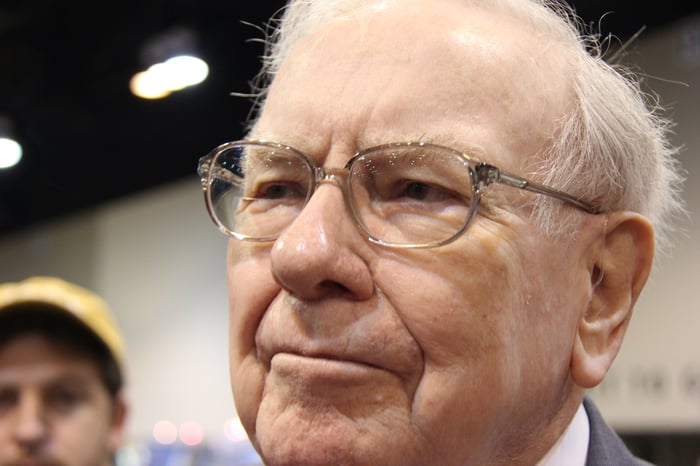|
|
|

|
|||||

|
|
Billionaire Warren Buffett has crushed the benchmark S&P 500 in the return column during his 60-year tenure as Berkshire Hathaway CEO.
The stock market is historically pricey, which has led Buffett to be a net seller of equities for nearly three years.
However, Berkshire's boss recently purchased more than 5 million shares of an industry-leading healthcare stock that's successfully navigated challenges before.
For the better part of 60 years, Berkshire Hathaway's (NYSE: BRK.A)(NYSE: BRK.B) billionaire CEO Warren Buffett has been outpacing the benchmark S&P 500 (SNPINDEX: ^GSPC) with ease. Whereas the stock market's broad-based index has gained close to 42,500%, including dividends, over the last six decades, the aptly nicknamed Oracle of Omaha has overseen a cumulative return in excess of 5,900,000% for his company's Class A shares (BRK.A).
Berkshire's stock lapping the S&P 500 nearly 140 times has encouraged some investors to ride Warren Buffett's coattails to substantial long-term gains.
Where to invest $1,000 right now? Our analyst team just revealed what they believe are the 10 best stocks to buy right now. Learn More »
Yet one of the odd quirks about Berkshire's billionaire boss is that he's not always a buyer. Though Buffett's acquisitions and investments are responsible for transforming Berkshire Hathaway into a trillion-dollar business, he's been a persistent net seller of stocks for 11 consecutive quarters.
But while Buffett is sending an unmistakable yet silent warning to Wall Street, he has found one historically cheap industry leader -- up well over 32,000% since its initial public offering (IPO) -- worth piling into.

Berkshire Hathaway CEO Warren Buffett. Image source: The Motley Fool.
Regardless of what Berkshire Hathaway's Form 13F filing might show on a quarter-to-quarter basis, the Oracle of Omaha is, at his core, an unwavering optimist on America and the stock market over the long run. He's repeatedly opined during annual meetings and in shareholder letters that investors shouldn't bet against America.
However, Warren Buffett is also unwavering when it comes to his desire to get a good deal. While he appreciates strong management teams, hearty capital-return programs, and sustainable moats, nothing holds more importance in the investment column than the perception of value.
At the moment, value is incredibly hard to come by. Although "value" is in the eye of the beholder and therefore subjective, a couple of backward-facing valuation metrics leave little room for argument that the stock market is historically pricey.
For instance, the S&P 500's Shiller price-to-earnings (P/E) ratio, which is also known as the cyclically adjusted P/E ratio (CAPE ratio), recently hit its third-priciest multiple when back-tested 154 years. Whereas the average Shiller P/E reading is a little over 17, dating back to January 1871, this valuation tool hit a reading of almost 39 in late July.
S&P 500 Shiller CAPE Ratio data by YCharts.
It's a somewhat similar story for the metric that Warren Buffett referred to as "probably the best single measure of where valuations stand at any given moment" in an interview with Fortune magazine in 2001. The market cap-to-GDP ratio, which is now affably known as the "Buffett Indicator," topped 210% recently. In comparison, the cumulative value of all public stocks divided by U.S. gross domestic product (GDP) has averaged closer to 85% when back-tested to 1970.
The stock market is historically pricey, and Warren Buffett's persistent selling activity at Berkshire Hathaway demonstrates this. Spanning 11 quarters (Oct. 1, 2022 to June 30, 2025), Berkshire's billionaire chief sold $177.4 billion more in stock than was purchased.
Even Berkshire Hathaway's own stock isn't impervious to Buffett's staunch, value-investing ideals. Following a stretch of 24 consecutive quarters of share buybacks, Buffett has now gone a full year without spending a dime to repurchase his own company's stock. The culprit? Berkshire's stock has been pretty consistently hovering at a 60% to 80% premium-to-book value, which is too rich a price to pay for share repurchases.
But in spite of this silent warning, Berkshire's 13F showed that its CEO did find at least one screaming bargain during the June-ended quarter.

Image source: Getty Images.
Throughout his years as Berkshire Hathaway's lead investor, Warren Buffett has demonstrated a willingness to wait for price dislocations to become apparent. A more-than-halving in health insurance and healthcare services stock UnitedHealth Group (NYSE: UNH) in the span of two months provided just the emotion-driven price dislocation he was waiting for.
During the second quarter, Buffett oversaw the purchase of 5,039,564 shares of UnitedHealth stock, which at the midpoint of the year was worth about $1.57 billion.
UnitedHealth's falls from grace is due to a variety of factors, including (in no particular order):
While these are tangible, near-term concerns for the company, UnitedHealth Group stock didn't rocket higher by more than 32,000%, including dividends, since its IPO in 1984 by accident. It's pretty consistently delivered for investors thanks to well-defined competitive edges and a keen eye on costs.
Though Buffett often sticks to the financial sector, he's a big fan of insurance companies. The premise for insurers is the same, whether they're insuring property or the health of individuals. Their goal is to bring in more in premium than will be outlaid in claims. The inevitability of claims is what allows insurers to possess strong premium pricing power more often than not.
UnitedHealth Group will aggressively address higher utilization rates and increased medical costs by reducing the number of unprofitable Medicare Advantage members it covers and/or raising premiums, where applicable. While righting the ship doesn't happen at the drop of a dime, UnitedHealth has successfully navigated similar challenges before.
Furthermore, subsidiary Optum has played a critical role in UnitedHealth's growth. This is the segment that provides care delivery, pharmacy care services, and even the software that hospitals use. Optum has consistently generated higher margins than the insurance operations and is the company's quickest ticket to a turnaround.
If UnitedHealth Group were to simply meet Wall Street's tempered consensus EPS projection for 2026, it could be purchased, as of this writing on Aug. 21, for a forward-year profit multiple of 16. This works out to a 16% discount to its average forward-year P/E ratio over the trailing-five-year period. When coupled with UnitedHealth's growing dividend, it checks all the right boxes as a shareholder-friendly, time-tested company that's experienced a (likely) temporary price dislocation.
Before you buy stock in UnitedHealth Group, consider this:
The Motley Fool Stock Advisor analyst team just identified what they believe are the 10 best stocks for investors to buy now… and UnitedHealth Group wasn’t one of them. The 10 stocks that made the cut could produce monster returns in the coming years.
Consider when Netflix made this list on December 17, 2004... if you invested $1,000 at the time of our recommendation, you’d have $649,657!* Or when Nvidia made this list on April 15, 2005... if you invested $1,000 at the time of our recommendation, you’d have $1,090,993!*
Now, it’s worth noting Stock Advisor’s total average return is 1,057% — a market-crushing outperformance compared to 185% for the S&P 500. Don’t miss out on the latest top 10 list, available when you join Stock Advisor.
*Stock Advisor returns as of August 18, 2025
Sean Williams has no position in any of the stocks mentioned. The Motley Fool has positions in and recommends Berkshire Hathaway. The Motley Fool recommends UnitedHealth Group. The Motley Fool has a disclosure policy.
| 6 hours | |
| 7 hours |
Stock Market Week: Reaction To Iran, Berkshire Earnings, Apple Event
BRK-B
Investor's Business Daily
|
| 7 hours |
Stock Market Week: Reaction To Iran, Berkshire Earnings, Apple Event
BRK-A
Investor's Business Daily
|
| 8 hours | |
| 9 hours | |
| 9 hours | |
| 10 hours | |
| 10 hours | |
| 11 hours | |
| 11 hours |
Warren Buffett's successor Greg Abel publishes his first letter to Berkshire Hathaway shareholders
BRK-A
Associated Press Finance
|
| 11 hours | |
| 17 hours | |
| 18 hours | |
| Feb-27 | |
| Feb-27 |
Join thousands of traders who make more informed decisions with our premium features. Real-time quotes, advanced visualizations, backtesting, and much more.
Learn more about FINVIZ*Elite